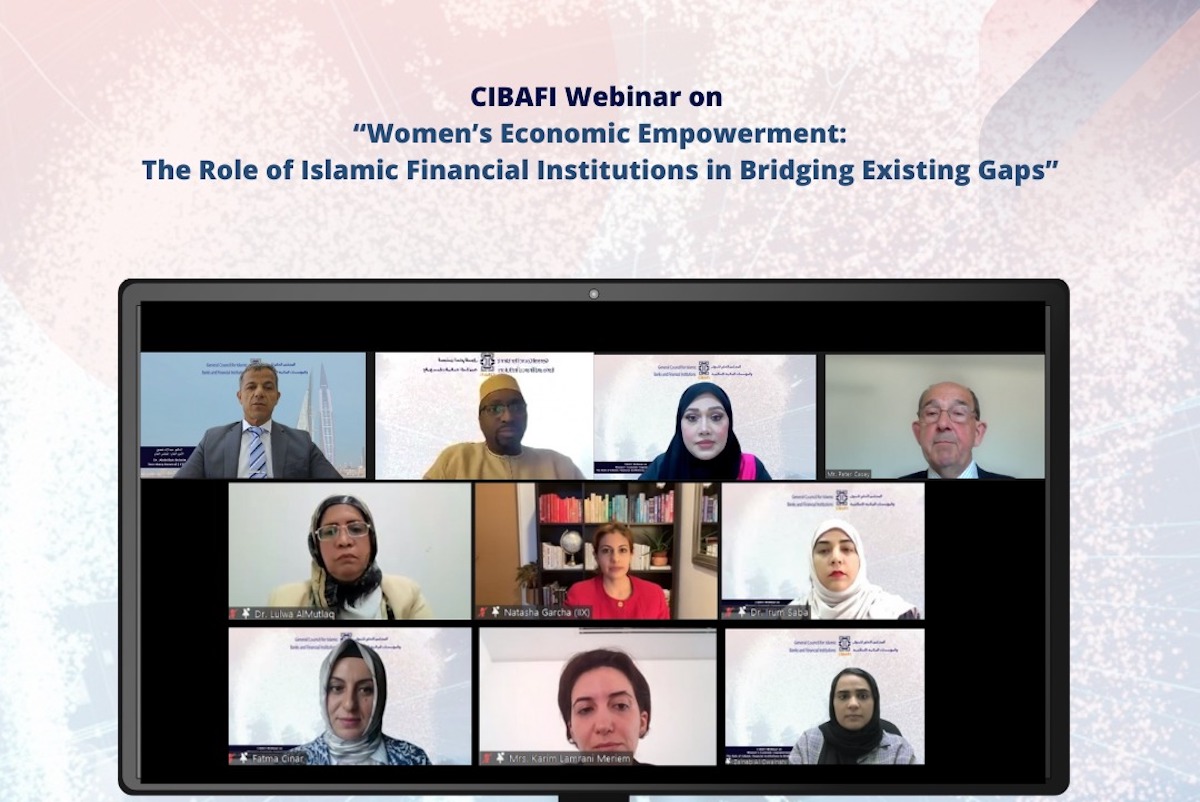
Women's Economic Empowerment: The Role of Islamic Financial Institutions in Bridging Existing Gaps
UNDP IICPSD participated in CIBAFI’s webinar on “Women’s Economic Empowerment: The Role of Islamic Financial Institutions in Bridging Existing Gaps.”
20 June 2022 – Manama, Kingdom of Bahrain, The United Nations Development Programme Istanbul International Center for Private Sector in Development (IICPSD) participated in the General Council for Islamic Banks and Financial Institutions’ (CIBAFI) webinar on “Women’s Economic Empowerment: The Role of Islamic Financial Institutions in Bridging Existing Gaps.”
The webinar announced the launch of the 7th CIBAFI Global Islamic Bankers’ Survey (GIBS) Report, which focuses on the theme of “Women Empowerment: Evaluating the Current Practices and Challenges.” The report provides an assessment on women empowerment in the Islamic banking sector and the measures taken by Islamic banks to empower women, both as workers and as customers.
The webinar began with welcoming remarks from Dr. Abdelilah Belatik, Secretary General of CIBAFI, and featured keynote speeches from H.E. Prof. Dr. Koutoub Moustapha Sano, Secretary General of the International Islamic Fiqh Academy, Saudi Arabia, and H.E. Dr. Maryam Buti Al Suwaidi, Chief Executive Officer of the Securities and Commodities Authority, United Arab Emirates.
The opening session was followed by a presentation on the main findings of the GIBS 2022 Report by Mr. Peter Casey, Consultant at CIBAFI.
During the panel session, industry experts and women leaders discussed the role of Islamic financial institutions in achieving women’s economic empowerment. The session covered critical enablers of and barriers to women’s economic empowerment and assessed the tools with which Islamic financial institutions can achieve women’s economic empowerment and sustainable development.
The panel session was moderated by Ms. Zainab Al Owainaty, Director of Administration and Finance at CIBAFI, and the panelists included Dr. Lulwa Al Mutlaq, Founder and President, of Golden Trust, Bahrain; Ms. Natasha Garcha, Senior Director, Innovative Finance and Gender-Lens Investing Specialist at Impact Investment Exchange (IIX), Singapore; Dr. Irum Saba, Associate Professor and Program Director at the Institute of Business Administration, Karachi, Pakistan; Ms. Fatma Çinar, Islamic Finance Portfolio Lead at IICPSD, Turkey; and Ms. Meriem Lamrani Karim, Head of the Prudential Regulation Unit at Bank Al-Maghrib, Morocco.
During the panel session, IICPSD’s Portfolio Lead Ms. Fatma Çınar highlighted the importance of women’s economic empowerment in achieving inclusive economic growth and sustainable development. She then highlighted the issue of gender-based inequalities, stressing that UN Women’s report found the labor force participation rate for women aged 25-54 stands at just 63%, compared to 94% for men.[1] Ms. Çınar then raised the gender-based digital divide and highlighted that most of the 3.9 billion people who are offline live in rural areas, are poorer, are less-educated and tend to be women and girls.[2] Ms. Çınar then emphasized that women are less likely to be entrepreneurs and face more disadvantages when starting businesses by noting that in 40% of countries women’s early-stage entrepreneurial activity is less than half that of men’s.[3] Ms. Çınar then stressed that women also face barriers to achieving high leadership positions by illustrating that only 5% of Fortune 500 CEOs are women.[4]
Ms. Çınar then highlighted Islamic financial institutions’ role in women’s economic empowerment, underlining how Islamic social finance instruments, including Islamic microfinance and qard al hasan, and offering women-specific capacity-building programs can empower women.
Lasty, Ms. Çınar highlighted the lack of women board members in Islamic financial institutions (IFIs), as noted by CIBAFI and the World Bank Report.[5] She stressed that, while there is a need for guidelines and regulations that encourage gender diversity, IFIs should take the initiative to ensure more qualified women members sit on boards and work in management roles.
[1] UN Women, Turning Promises into Action: Gender Equality in the 2030 Agenda for Sustainable Development (New York, 2018). Available at: https://www.unwomen.org/en/digital-library/publications/2018/2/gender-equality-in-the-2030-agenda-for-sustainable-development-2018
[2] E/CN.6/2018/3. Available at: http://undocs.org/E/CN.6/2018/3
[3] Global Entrepreneurship Monitor, GEM 2016/2017 Women’s Entrepreneurship Report (2017). https://www.gemconsortium.org/report/49860
[4] Cheryl, Women CEOs of the S&P 500 (2014). http://www.catalyst.org/knowledge/women-ceos-sp-500
[5] CIBAFI and World Bank Group, Corporate Governance Practices in Islamic Banks 2017 (2017). https://islamicbankers.files.wordpress.com/2019/02/finalengcibafi-theworldbankcgreport.pdf